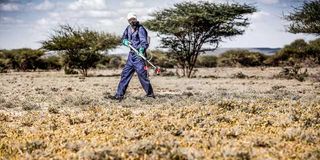Kenya to lose Sh13.6bn as disasters raid farms

A member of National Youth Service sprays pesticides in an area infested with hopper bands of desert locust next to Lokichar, Turkana County, on June 9, 2020
What you need to know:
- The report also indicates that 88,460 households were affected by either floods or the Covid-19 pandemic that in turn hurt their food security.
- In regard to Covid-19, the report says food output and supply during the year is likely to be affected due to inadequate utilisation of recommended inputs as a result of depleted household resources.
The country is expected to lose approximately Sh13.6 billion worth of farm produce this year due to the locust invasion, floods and restriction of movement imposed to curb the spread of the coronavirus.
Agriculture Cabinet Secretary Peter Munya, in a report to the Senate Agriculture committee on the state of food security in Kenya said about 82,801 hectares under rain-fed and irrigated crops were affected in 29 counties.
The report also indicates that 88,460 households were affected by either floods or the Covid-19 pandemic that in turn hurt their food security.
In regard to Covid-19, the report says food output and supply during the year is likely to be affected due to inadequate utilisation of recommended inputs as a result of depleted household resources.
“The percentage loss was approximately between 70 [and] 90 per cent depending on area and type of crop.Overall, the country is expected to lose an estimated Sh13.6 billion worth of crop produce during the year,” reads the report.
IMPACT ASSESSMENT
Although the ministry said it is yet to conclude the impact assessment of the locust invasion, it projected that at least 40 per cent of the cropped area will be lost, exposing thousands of households to food and nutrition security.
They will, therefore, need government aid to maintain their production capacity in subsequent seasons.
Mr Munya has, however, assured Kenyans that the country is food-secure despite the movement restrictions.
To address food security concerns caused by flooding, the government has provided suitable seeds, seedlings and traditional high value planting materials to maintain food production capacity.
The CS said the ministry has procured 72 metric tonnes of rice seeds that will be distributed to farmers, especially those who lost their crops to floods.
“The interventions will revolve around key areas such as extension service provision, access to quality seeds and fertiliser, access to finance, post-harvest handling and marketing,” Mr Munya said.
NUTRITION
The national food and nutrition security, he added, is fairly stable as food prices and domestic supply remained steady for all food staples.
“Adequate food is available in all markets. The 2020 long rains season commenced well and on time and the prevailing good weather is conducive for agricultural production especially in the high potential counties,” Mr Munya said.
As at May, the report says, there were 12,200,814 bags of maize, 4.5 million of beans, 2.9 million of wheat and 1.1 million of rice.
The CS said the food balance sheet projected to the end of this month indicates a surplus of 1.8 million bags of maize, 4.2 million bags of bans, 1.9 million bags of wheat and 411,000 bags of rice.
AVAILABLE MAIZE
The available maize is sufficient up to the end of this month, according to Mr Munya.
The report indicates that the 2019 short and long rains resulted in production of 43.3 million bags of maize, which is a decline compared to 44.5 million bags produced in 2018.





